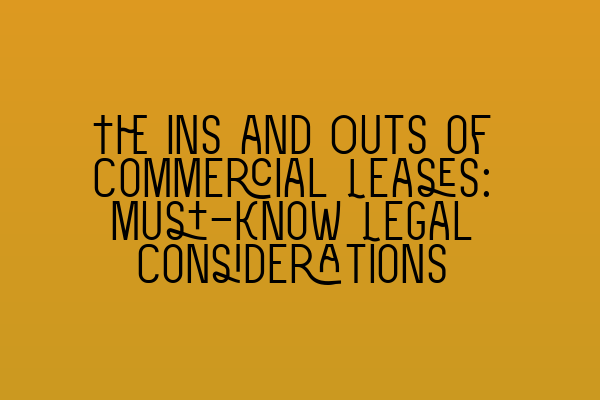The Ins and Outs of Commercial Leases: Must-Know Legal Considerations
A commercial lease is a legally binding agreement between a landlord and a tenant for the rental of a commercial property. It is crucial for both parties to have a comprehensive understanding of the legal considerations involved in commercial leases to ensure a smooth and mutually beneficial relationship. In this article, we will explore the key aspects that landlords and tenants should be aware of when entering into a commercial lease.
1. Lease Terms and Contractual Obligations
The lease terms outline the rights and responsibilities of both the landlord and the tenant. It is essential to carefully review and understand these terms before signing the lease. Important considerations include:
- The duration of the lease and any renewal options
- The rent amount and frequency of payment
- Responsibility for property repairs and maintenance
- Conditions for lease termination or early termination
- Provisions for rent increases
By fully understanding these terms, both parties can avoid potential disputes and ensure a clear understanding of their obligations and rights.
2. Rent Review
In many commercial leases, there is a provision for rent review, which allows the landlord to adjust the rent periodically. Rent reviews can be carried out in various ways, such as fixed increases, market value assessments, or using a predetermined formula. Understanding the rent review process is crucial for both landlords and tenants, as it can have a significant financial impact.
If you are a landlord or tenant seeking assistance with a commercial lease or other property law matters, SQE Property Law & Land Law can provide expert legal advice and representation. They have extensive experience in dealing with commercial leases and can ensure that your interests are protected. Visit their website for more information on their services and to schedule a consultation.
3. Use of the Property
The commercial lease should specify the permitted use of the property by the tenant. This ensures that the tenant’s business activities comply with any zoning or other regulations in place. It is essential for the tenant to accurately describe their intended use of the premises to avoid breaching the lease terms or facing legal consequences.
If a tenant wishes to change or expand their business activities during the lease term, they should seek the landlord’s approval and, if necessary, negotiate lease modifications to accommodate the proposed changes. Consulting with a property law expert, such as SQE Property Law & Land Law, can help tenants navigate the process and ensure compliance with all legal requirements.
4. Repair and Maintenance Responsibilities
A commercial lease should clearly establish the repair and maintenance responsibilities of both the landlord and the tenant. This includes the scope of repairs, who is responsible for carrying them out, and the financial implications. Careful attention should be given to the condition of the property before entering into a lease, as any existing damages should be documented to avoid disputes later on.
Additionally, landlords should comply with health and safety regulations and provide tenants with safe and habitable premises. Tenants, on the other hand, are generally responsible for the upkeep and maintenance of their leased space, including fixtures and fittings.
5. Assignment and Subletting
If a tenant wishes to assign their lease to another party or sublet the premises, they should seek the landlord’s consent and review the lease terms regarding assignment and subletting. The lease should clearly outline the conditions and procedures for such arrangements to avoid any misunderstandings or breaches of contract.
Landlords should carefully consider any requests for assignment or subletting and assess the financial stability and suitability of the proposed assignee or subtenant. Consulting with a property law expert can help landlords navigate these complex issues and ensure compliance with legal requirements.
Conclusion
Entering into a commercial lease is a significant decision that comes with various legal considerations. Both landlords and tenants must be fully aware of their rights and obligations to ensure a successful and harmonious lease agreement. By understanding lease terms, rent review processes, permitted property use, repair and maintenance responsibilities, and assignment/subletting provisions, both parties can protect their interests and avoid potential disputes.
If you require professional legal assistance with commercial leases or other property law matters, reach out to SQE Property Law & Land Law. Their expert solicitors can provide tailored advice and representation to ensure your dealings are legally sound and optimized for your needs.
Related Articles:
